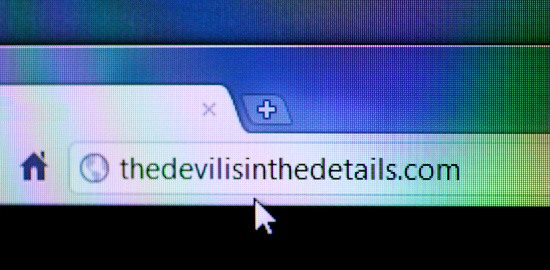Industry Insights
Are You a Master of Your Domain?

Every day, millions of dollars spent by organizations on branding and marketing are seriously undermined, put at risk, or worse, lost by undervaluing one small detail: domain names. But the devil is in the details, as they say. Business owners and marketing professionals need to pay close attention to this piece of the marketing puzzle. So let's take a look at a few areas where your domain affects your brand.
Your front door
A domain is an important touch point that makes a statement about your brand. That's right, before someone ever sees your website, online store or community, your domain name has already been speaking about you. Think of your domain like your front door. It needs to make an appropriate impression. And if you consider a recent article in the Globe & Mail which ranked Canadians as the highest Internet users in the world, you quickly realize that your future customers are much more likely to see you online before they ever enter the front door of your store.
I am Canadian. That's good…right?
Of the many things it may communicate, a domain name can indicate where you and your market are located. The .ca domains are hugely popular in Canada because it says you are Canadian, which is important to Canadians. We like to buy within Canada. We trust Canadians. So clearly, the choice of a .ca domain has the ability to help your Canadian business. However, it may have downsides as well. What if you're a global company? People in the United States may not share the same appreciation for .ca domains that we Canadians do. The .ca extension could also convey that your business is exclusive to Canadians.
youcantrustus.com
Your name can also give an impression of stability. And stability is just a short jump to credibility. This is why companies publicly celebrate 25-year anniversaries, or tout being in business since 1950. So how does a domain communicate this? Businesses that have been around since the start of the Internet often have higher quality domain names. They are either the business name itself or a shorter version of it. Consider Hewlett-Packard who registered HP.com in 1986, or Apple who registered their apple.com a year later in 1987.
Today of course, start-ups struggle to get quality domains due to lack of availability. They end up with one of the less preferred extensions (.ca, .net, .org, .biz). Their domains tend to be longer in length, and may even have unfortunate elements like dashes or business designations like "ltd" or "inc." Right or wrong, a concise and more accurate domain is going to give your business more credibility.
Easy to use and share
While your website is the central hub for your brand online, it's not the only place people are talking about you. Your brand is being shared and discussed on blogs, forums, Twitter, Facebook, YouTube, and the list goes on. The more concise your domain name is, the easier it is to recognize, use and share. People want to talk about you. Make it easy for them.
Consider companies who have gone to great lengths for that perfect phone number. These numbers do more than just look great in marketing materials – they are memorable and functional. In the same way, your domain name should improve your potential customer's interaction with you. Make it easy to type, easy to say, and most importantly, easy to remember!
Where the problem begins
So, for such an important operational and marketing tool, why are these tiny pieces of digital real estate so grossly undervalued? I think the problem originates when the domain is first registered. Do you remember what you paid for your company's domain? I would guess it was somewhere between $10 and $20. And it was likely a decision that didn't involve too much thought or energy – there are weeks that I spend more than that at Tim Hortons! Perhaps it's difficult to truly value a commodity that only costs a mere $15 a year.
However, the availability of good domain names is rapidly decreasing. There is scarcity built into the English language. And when availability goes down, price goes up. While prices from domain name registrars remain around $15, more desirable names are being purchased by domain investors and resold for much more. It is likely that you will need to consider the value of your domain more closely in the future as the costs of securing one continue to go up…
This has been the first in a series of articles on mastering your domain. Stay tuned for upcoming articles on establishing an appropriate budget for your domain and how to choose the right domain name.

Written by Jonathan Reinink
May 9, 2011